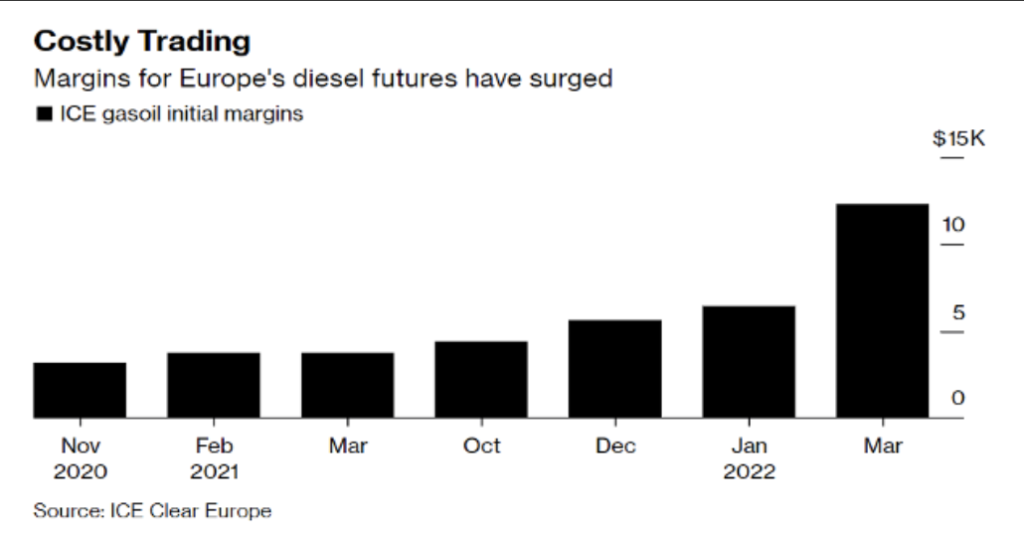In the autumn of 324 BCE and just a few months before his death, Alexander the Great organized a magnificent banquet in the Babylonian city of Opis, by the banks of the Tiger River. There were more than nine thousand guests from several nations at that banquet. All eyes were on Alexander and the silver cup in front of him. The cup actually belonged to the defeated King of Persia Darius III. Opis symbolized historical transitions (from the Babylonians to the Persians and now to the Greeks who were unfolding a new balance of power around the world).
Commodity prices are becoming erratic (see indicative graphs below ). It seems that volatility is becoming an asset class by itself. There are clear signs that liquidity in that market is draining. Financial constraints are popping up everywhere, including at the LME (London Metals Exchange) which was forced to shut down for several days, an event that might be foretelling of its future. Lawmakers insist that inflation should be exercised, reminding us of the Diocletian decree (who reigned as Roman Emperor between 284-305 AD) that all prices be frozen. We might as well order the winds not to blow, or even better, order that the tides cannot rise.
In the meantime, useful idiots are drinking Dulcamara’s elixir (In Part II, we will incorporate Donizetti’s opera into the discussion).



In people’s eyes, the Opis banquet symbolized the culmination of 170 years of war between Greece and Persia. Given that Alexander carried with him a copy of the Iliad (edited and annotated by his teacher Aristotle), he probably saw in the event what Herodotus would have seen: the culmination of a war between the West and the East that started 870 years earlier in the Trojan War. So, Alexander raised the cup and offered a prayer for peace, as a prelude to a millennial transformation. After all, he was – and possibly still is – the only one who pushed the art of the possible to its limits.
In the meantime, useful idiots are drinking Dulcamara’s elixir.
The commodities mayhem, where hundreds of billions of dollars are at stake (including derivative contracts), is becoming a force by itself as traders are rushing to close positions, which, in turn, exacerbates volatility. Illiquid markets (like in the nickel market) could unleash volatility in other markets such as electric vehicle batteries or the stainless steel market. As this kind of volatility spreads to other commodities – such as aluminum – the trading spreads become even more erratic, which, in turn, is magnified by algorithmic trading.
And then, we have the crude market where intraday swings are hitting records. How can you price and insure the risk of $10 swings within a day? When energy giants (such as the German Uniper) have to borrow billions of dollars to put up as collateral for margin calls, you know that we have a problem.
In the meantime, useful idiots are drinking Dulcamara’s elixir.
As Russian oil is ostracized from the markets (reportedly it is being discounted by as much as $30/bbl), and as India and China are unable to absorb the barrels that the West used to import, Russian production will shut in and the possibility of losing (on a long-term basis) between 2-3 million barrels of oil per day is pretty high, which, in turn, will feed into crude’s upswing trajectory. The situation with natural gas might be a bit worse especially if Russia cuts off European supplies and European inventories are depleted by Q4. At that point – if not sooner – demand destruction will be unfolding (reduced production levels), recession will follow, and lights may be turning dark. There is a realignment in the energy markets.
As Alexander raised his cup to offer a prayer to the gods, he could possibly foresee the linearity in historical evolution from the Athenian democracy to the destruction of the Peloponnesian War that gave birth to his Macedonian Kingdom, only to be followed by the reins of the Hellenistic world run by his successors, who, in turn, were replaced by the Romans, and who, in turn, were succeeded by the Byzantine Empire.
In the non-linear world, useful idiots are still drinking Dulcamara’s elixir, not realizing that there are those unique battles that mark the end of a historical chapter and the beginning of a new era marked by “the influence of the bank…the influence of money upon mankind, who does not see the force of the management of a monied concern, which is so much more extensive, and in its nature so much more depending on the managers …to divert the whole of hopes and fears of the people from their usual channels, into the impulses passions, and superstitions of those who live on chances” (Edmund Burke, On the Revolution in France).
